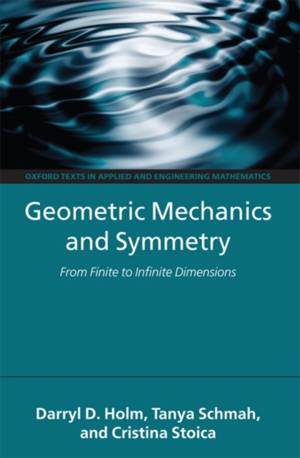
En raison d'une grêve chez bpost, votre commande pourrait être retardée. Vous avez besoin d’un livre rapidement ? Nos magasins vous accueillent à bras ouverts !
- Retrait gratuit dans votre magasin Club
- 7.000.000 titres dans notre catalogue
- Payer en toute sécurité
- Toujours un magasin près de chez vous
En raison de la grêve chez bpost, votre commande pourrait être retardée. Vous avez besoin d’un livre rapidement ? Nos magasins vous accueillent à bras ouverts !
- Retrait gratuit dans votre magasin Club
- 7.000.0000 titres dans notre catalogue
- Payer en toute sécurité
- Toujours un magasin près de chez vous
Geometric Mechanics and Symmetry
From Finite to Infinite Dimensions
Darryl D Holm, Tanya Schmah, Cristina Stoica
218,45 €
+ 436 points
Format
Description
Classical mechanics, one of the oldest branches of science, has undergone a long evolution, developing hand in hand with many areas of mathematics, including calculus, differential geometry, and the theory of Lie groups and Lie algebras. The modern formulations of Lagrangian and Hamiltonian mechanics, in the coordinate-free language of differential geometry, are elegant and general. They provide a unifying framework for many seemingly disparate physical systems, such as n-particle systems, rigid bodies, fluids and other continua, and electromagnetic and quantum systems. Geometric Mechanics and Symmetry is a friendly and fast-paced introduction to the geometric approach to classical mechanics, suitable for a one- or two- semester course for beginning graduate students or advanced undergraduates. It fills a gap between traditional classical mechanics texts and advanced modern mathematical treatments of the subject. After a summary of the necessary elements of calculus on smooth manifolds and basic Lie group theory, the main body of the text considers how symmetry reduction of Hamilton's principle allows one to derive and analyze the Euler-Poincaré equations for dynamics on Lie groups. Additional topics deal with rigid and pseudo-rigid bodies, the heavy top, shallow water waves, geophysical fluid dynamics and computational anatomy. The text ends with a discussion of the semidirect-product Euler-Poincaré reduction theorem for ideal fluid dynamics. A variety of examples and figures illustrate the material, while the many exercises, both solved and unsolved, make the book a valuable class text.
Spécifications
Parties prenantes
- Auteur(s) :
- Editeur:
Contenu
- Nombre de pages :
- 460
- Langue:
- Anglais
- Collection :
- Tome:
- n° 12
Caractéristiques
- EAN:
- 9780199212903
- Date de parution :
- 11-10-09
- Format:
- Livre relié
- Format numérique:
- Genaaid
- Dimensions :
- 236 mm x 157 mm
- Poids :
- 924 g

Les avis
Nous publions uniquement les avis qui respectent les conditions requises. Consultez nos conditions pour les avis.






